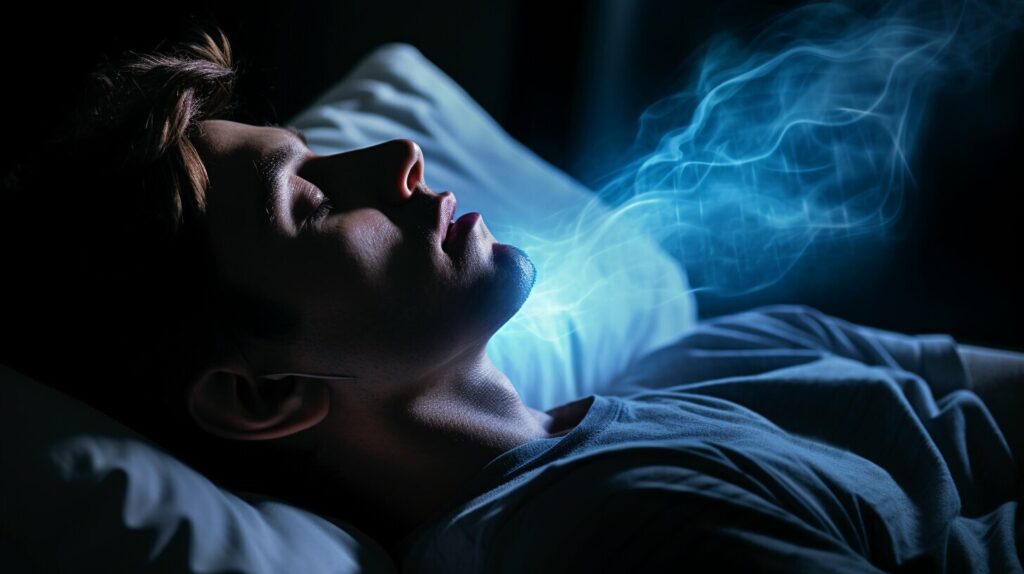Have you ever woken up to find that you are grabbing or holding onto your partner during sleep? Or maybe your partner has complained about being grabbed or even hit during your slumber? If so, you may be experiencing a sleep behavior disorder.
Sleep behavior disorders can cause a variety of involuntary movements during sleep, including grabbing or acting out physically. This can not only be frustrating for your partner, but it can also be dangerous for both of you.
In this article, we will explore the reasons behind why you might keep grabbing your partner in your sleep. We will delve deeper into sleep behavior disorders and their impact on sleep-related movements. We will also discuss common sleep disturbances that can contribute to grabbing behavior and provide coping strategies for managing this behavior.
Key Takeaways:
- Grabbing behavior during sleep can be a sign of a sleep behavior disorder.
- Sleep behavior disorders can cause a variety of involuntary movements during sleep.
- Common sleep disturbances can contribute to grabbing behavior during sleep.
Understanding Sleep Behavior Disorders
Have you ever experienced involuntary movements during your sleep? Maybe you’ve even grabbed your partner while you were asleep and couldn’t explain why. If so, you may be dealing with a sleep behavior disorder.
Sleep behavior disorders are a group of conditions that can cause unusual and potentially disruptive movements during sleep. These disorders can include sleepwalking, sleep talking, and even acting out physically during sleep.
One type of sleep behavior disorder that could be responsible for grabbing your partner in your sleep is known as a sleep-related movement disorder. This condition is characterized by involuntary movements during sleep, such as kicking or punching.
There are several different sleep-related movement disorders that could be the culprit of your grabbing behavior. These include restless leg syndrome, periodic limb movement disorder, and even REM sleep behavior disorder.
Restless leg syndrome is a condition that causes an uncomfortable sensation in the legs, leading to an uncontrollable urge to move them. This can occur during the day, but it is typically worse at night, leading to difficulty sleeping.
Periodic limb movement disorder is characterized by repetitive movements of the limbs, such as kicking or jerking, during sleep. These movements can be so frequent and intense that they can disrupt sleep and the sleep of others in the same room.
REM sleep behavior disorder is a more serious condition that causes people to act out their dreams physically. This can include kicking, punching, or even shouting. If you have this condition, you may not even realize that you are acting out your dreams while you sleep.
| Key takeaway: | Sleep behavior disorders can cause involuntary movements during sleep, including grabbing behavior. There are several different types of sleep-related movement disorders, including restless leg syndrome, periodic limb movement disorder, and REM sleep behavior disorder. |
|---|
It’s important to understand that sleep behavior disorders are not your fault, and they are not intentional. If you are experiencing grabbing behavior during sleep, it’s essential to seek professional help to identify the underlying cause and find an appropriate treatment plan.

Common Sleep Disturbances That Contribute to Grabbing Behavior
There are several sleep disturbances that can cause involuntary movements during sleep, including grabbing behavior. These disorders can significantly impact the quality of your sleep and affect your partner’s sleep as well. In this section, we will discuss some of the most common sleep disturbances associated with grabbing behavior.
Restless Leg Syndrome
Restless Leg Syndrome (RLS) is a neurological disorder that causes an uncontrollable urge to move your legs, typically during periods of inactivity or while trying to fall asleep. People with RLS often describe it as a crawling, tingling, or itching sensation in their legs, which can be relieved by movement. The constant urge to move your legs can lead to involuntary movements during sleep, such as kicking or grabbing, which can disrupt your partner’s sleep.
Periodic Limb Movement Disorder
Periodic Limb Movement Disorder (PLMD) is a sleep disorder characterized by repetitive limb movements during sleep. These movements can occur every 20-40 seconds and may last for several minutes, causing frequent awakenings and disruption of the sleep cycle. People with PLMD often experience involuntary leg movements that can lead to grabbing or kicking during sleep, resulting in sleep disruption for both partners.
It’s important to note that not everyone with RLS or PLMD experiences grabbing behavior during sleep. However, if you are consistently grabbing your partner in your sleep, it may be worth discussing with a healthcare professional to rule out these sleep disorders.

Next, we will discuss sleep-related violence and aggression and how certain sleep disorders can lead to aggressive or violent actions during sleep.
Sleep-Related Violence and Aggression
While grabbing behavior during sleep may be distressing, it can escalate to violence and aggression in some cases. Sleep-related violence and aggression are uncommon but can occur in individuals with certain sleep disorders like REM sleep behavior disorder (RBD).
RBD is a parasomnia in which individuals act out their dreams while they are still asleep. During a dream, if the individual encounters a threatening situation, they may physically respond to it. This can result in hitting, kicking, or grabbing their sleeping partner. Individuals with RBD may not remember their actions upon awakening.
| Signs of RBD: | 1. Violent arm and leg movement during sleep |
|---|---|
| 2. Screaming or talking during sleep | |
| 3. Injuries to themselves or their partner |
It is important to recognize the signs of RBD and seek medical help. A sleep specialist can diagnose RBD through a sleep study and prescribe medication or other treatments to manage the condition. In addition to RBD, other sleep disorders like sleepwalking and night terrors can also lead to sleep-related violent behavior.

If you or your partner are experiencing sleep-related violence or aggression, it is crucial to seek professional help immediately. Ignoring these symptoms may lead to serious harm to yourself or your partner.
The Connection Between Sleep Disordered Breathing and Grabbing Behavior
If you or your partner are experiencing grabbing behavior during sleep, sleep disordered breathing may be a contributing factor. Sleep disordered breathing refers to a range of breathing abnormalities that occur during sleep. These abnormalities can lead to less restful sleep and potentially contribute to involuntary movements, such as grabbing.
One common sleep disordered breathing condition is sleep apnea, where breathing is repeatedly interrupted during sleep. This can lead to lower levels of oxygen in the body, causing the brain to send signals to wake up and resume breathing. These repeated wake-ups can result in fragmented sleep and may contribute to sleep-related movements and behaviors like grabbing.

Other sleep-related breathing disorders that may contribute to grabbing behavior include central sleep apnea and hypoventilation syndrome. These conditions can cause similar disruptions to sleep and lead to involuntary movements during sleep.
If you suspect that sleep disordered breathing may be contributing to your grabbing behavior, it is important to seek professional help for a proper diagnosis and treatment plan. Your healthcare provider may recommend a sleep study to monitor your breathing patterns and identify any sleep disorders that may be present.
Seeking Professional Help and Diagnosis
It’s important to seek professional help if you are consistently grabbing your partner in your sleep. A sleep study can help diagnose the underlying sleep disorder contributing to this behavior. You might be referred to a specialist who can provide treatment options such as medication, therapy, or lifestyle changes.
During a sleep study, sensors will be attached to your scalp, face, chest, limbs, and finger. The sensors will monitor your brain waves, eye movements, heart rate, muscle activity, and even the oxygen level in your blood. This data will be analyzed by a sleep specialist who can identify any abnormal sleep patterns and diagnose the specific sleep disorder contributing to your grabbing behavior.
It’s essential to take sleep disorders seriously, as they can have severe consequences for your overall health and quality of life. Seeking professional help and following a proper treatment plan can significantly improve your sleep and reduce the likelihood of grabbing behavior.

Coping Strategies for Managing Grabbing Behavior
If you are consistently grabbing your partner in your sleep, there are several coping strategies that can help manage this behavior. It is important to keep in mind that addressing any underlying sleep disorders is crucial for long-term success. However, these strategies can help promote a peaceful slumber in the meantime.
- Create a Sleep-Friendly Environment: Make your bedroom a comfortable and inviting space. Invest in a supportive mattress and pillows. Keep the temperature cool and the room dark and quiet. Consider using essential oils, white noise machines, or blackout curtains to enhance your sleep environment.
- Practice Relaxation Techniques: Incorporate relaxation techniques into your bedtime routine. Deep breathing exercises, meditation, or gentle stretching can help calm the mind and body before sleep. Avoid engaging in stressful activities or conversations before bedtime.
- Seek Support: Talk to your partner about the grabbing behavior and seek their support and understanding. Consider sleeping in separate bedrooms or using a body pillow to create physical space. Seek the help of a therapist or counselor if necessary.

Image Source: https://seowriting.ai/32_6.png
Remember that managing grabbing behavior during sleep requires a comprehensive approach. By creating a sleep-friendly environment, practicing relaxation techniques, and seeking support, you can promote a peaceful slumber for both you and your partner.
Communicating with Your Partner
It’s important to communicate openly with your partner about the grabbing behavior and how it’s affecting both of you. Do your best to approach the conversation calmly and non-judgmentally, acknowledging that this is a medical issue that you’re working to address.
Remember that your partner may be feeling scared, worried, or even hurt by the grabbing behavior, so it’s important to show empathy and listen actively to their concerns. Be willing to work together as a team to find solutions that work for both of you.
Some tips for communicating with your partner include:
- Use “I” statements to express how you’re feeling rather than blaming or accusing your partner.
- Validate your partner’s feelings and make it clear that you understand how the grabbing behavior is affecting them.
- Be willing to compromise and work together to find strategies that help both of you sleep better.
Remember that seeking professional help and treatment can also be a positive step towards improving your sleep and reducing the grabbing behavior. Don’t hesitate to reach out to a sleep specialist for guidance and support.

Improving Sleep Quality
Improving your overall sleep quality can potentially reduce grabbing behavior during sleep. Here are some tips to promote a restful night’s sleep:
- Create a relaxing bedtime routine, such as taking a warm bath or reading a book
- Avoid caffeine and alcohol before bedtime
- Make sure your sleep environment is comfortable and conducive to sleep
- Stick to a consistent sleep schedule, even on weekends
In addition to these tips, relaxation techniques such as deep breathing, meditation, or yoga can also help improve sleep quality. Consider trying out different techniques to find what works best for you.

Remember, consistently poor sleep quality can indicate a more serious sleep disorder that requires professional intervention. If you are experiencing grabbing behavior during sleep or other sleep disturbances, it may be time to consult a sleep specialist for further evaluation and treatment.
When to Consult a Sleep Specialist
If you are experiencing consistent grabbing behavior during sleep and are unable to find relief through self-help strategies, it may be time to consult a sleep specialist. A sleep specialist is a medical professional with specialized training in diagnosing and treating sleep disorders.
Some signs that may indicate the need for a consultation with a sleep specialist include:
- Chronic sleep disturbance that affects your daily life
- Excessive daytime sleepiness
- Loud snoring or gasping for air during sleep
- Frequent awakenings during the night
- Irregular breathing patterns during sleep
Your primary care physician can refer you to a sleep specialist who can perform a sleep study to assess your sleep patterns and identify any underlying sleep disorders. Based on the results of the study, the sleep specialist can recommend appropriate treatments, such as medication or therapy.
Remember, seeking professional help is the first step towards better sleep and improved quality of life. Don’t hesitate to consult a sleep specialist if you are experiencing persistent grabbing behavior during sleep or any other sleep-related issues.

Conclusion
Grabbing behavior during sleep can be alarming and disruptive for both you and your partner. However, it can often be attributed to a sleep behavior disorder or other sleep disturbances.
If you find yourself consistently grabbing your partner during sleep, it is important to seek professional help and get a proper diagnosis. A sleep study can help identify the underlying cause of this behavior and lead to effective treatment options.
Additionally, implementing coping strategies such as creating a sleep-friendly environment and practicing relaxation techniques can help manage grabbing behavior during sleep. Open communication with your partner is also crucial in finding solutions and offering support.
Remember:
Improving overall sleep quality is key to reducing grabbing behavior during sleep. By prioritizing healthy sleep habits, bedtime routines, and seeking professional intervention when necessary, you can promote a restful night’s sleep for you and your partner.
FAQ
Q: Why do I keep grabbing my partner in my sleep?
A: Involuntary grabbing behavior during sleep can be caused by sleep behavior disorders and sleep disturbances, which may lead to movements or actions that you are unaware of while asleep.
Q: What are sleep behavior disorders?
A: Sleep behavior disorders are conditions that can cause involuntary movements or actions during sleep. They can include disorders such as restless leg syndrome, periodic limb movement disorder, and REM sleep behavior disorder.
Q: How do sleep disturbances contribute to grabbing behavior?
A: Certain sleep disturbances, like restless leg syndrome and periodic limb movement disorder, can cause involuntary movements during sleep, including grabbing. Disrupted sleep from conditions like sleep apnea can also potentially contribute to this behavior.
Q: Can sleep behavior disorders lead to violent or aggressive actions during sleep?
A: Yes, sleep behavior disorders like REM sleep behavior disorder can lead to aggressive or violent actions during sleep. It’s important to seek professional help if you experience such behaviors.
Q: Is there a connection between sleep disordered breathing and grabbing behavior?
A: Yes, conditions like sleep apnea, which involve sleep disordered breathing, can lead to disrupted sleep and potentially contribute to grabbing behavior during sleep.
Q: When should I seek professional help and a diagnosis?
A: If you consistently experience grabbing behavior during sleep, it is important to seek professional help. A sleep study and proper diagnosis can help identify the underlying cause of this behavior.
Q: What are some coping strategies for managing grabbing behavior?
A: To manage grabbing behavior, you can try creating a sleep-friendly environment, practicing relaxation techniques, and following a healthy sleep routine. These coping strategies may help promote a peaceful sleep.
Q: How can I communicate with my partner about the grabbing behavior?
A: Open communication is essential. Discuss the issue with your partner, seek support, and work together to find solutions that can help manage the grabbing behavior during sleep.
Q: How can I improve my overall sleep quality?
A: Improving sleep quality can potentially reduce grabbing behavior. Establish healthy sleep habits, follow a consistent bedtime routine, and practice relaxation techniques to promote a restful night’s sleep.
Q: When should I consult a sleep specialist?
A: If you suspect a more serious sleep disorder or if the grabbing behavior persists despite implementing coping strategies, it is advisable to consult a sleep specialist for further evaluation and treatment.






